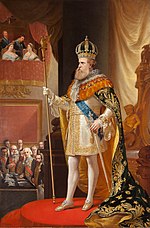sceptre
Jump to navigation
Jump to search
See also: Sceptre
English
[edit]
Alternative forms
[edit]Etymology
[edit]From Middle English septre, sceptre, from Old French sceptre, from Latin scēptrum, from Ancient Greek σκῆπτρον (skêptron, “staff, stick, baton”), from σκήπτω (skḗptō, “to prop, to support, to lean upon a staff”).
Pronunciation
[edit]- (UK) IPA(key): /ˈsɛptə/
Audio (Southern England): (file)
- (US) IPA(key): /ˈsɛptɚ/
- Hyphenation: scep‧tre
Noun
[edit]sceptre (plural sceptres)
- (British spelling) An ornamental staff held by a ruling monarch as a symbol of power.
- Synonyms: golden wand, royal wand
- 1769, Firishta, translated by Alexander Dow, Tales translated from the Persian of Inatulla of Delhi, volume I, Dublin: P. and W. Wilson et al., page 11:
- “Divine receptacle of excellence, let it not be deemed impertinent, or deviating from the rules of propriety, if I propound one queſtion which now labours in my breaſt; aſſuring me firſt, you will not let the ſceptre of true judgment depart from your right hand.”
- 1791, Homer, “[The Iliad.] Book I.”, in W[illiam] Cowper, transl., The Iliad and Odyssey of Homer, Translated into Blank Verse, […], volume I, London: […] J[oseph] Johnson, […], →OCLC, page 3:
- To the fleet he came / Bearing rich ranſom glorious to redeem / His daughter, and his hands charged with the wreath / And golden ſceptre of the God shaft-arm’d.
- 1891, Oscar Wilde, “The Young King”, in A House of Pomegranates, London: James R[ipley] Osgood, McIlvaine & Co […], →OCLC, page 6:
- But what had occupied him most was the robe he was to wear at his coronation, the robe of tissued gold, and the ruby-studded crown, and the sceptre with its rows and rings of pearls.
Derived terms
[edit]Translations
[edit]ornamental staff
|
Verb
[edit]sceptre (third-person singular simple present sceptres, present participle sceptring, simple past and past participle sceptred)
- To give a sceptre to.
- 1713, Thomas Tickell, On the Prospect of Peace:
- To Britain's queen the sceptred suppliant bends.
- (figurative) To invest with royal power.
Anagrams
[edit]French
[edit]Etymology
[edit]Borrowed from Latin scēptrum, itself borrowed from Ancient Greek σκῆπτρον (skêptron).
Pronunciation
[edit]Noun
[edit]sceptre m (plural sceptres)
Further reading
[edit]- “sceptre”, in Trésor de la langue française informatisé [Digitized Treasury of the French Language], 2012.
Categories:
- English terms derived from Proto-Indo-European
- English terms derived from the Proto-Indo-European root *-trom
- English terms inherited from Middle English
- English terms derived from Middle English
- English terms derived from Old French
- English terms derived from Latin
- English terms derived from Ancient Greek
- English 2-syllable words
- English terms with IPA pronunciation
- English terms with audio pronunciation
- English lemmas
- English nouns
- English countable nouns
- British English forms
- English terms with quotations
- English verbs
- en:Monarchy
- French terms borrowed from Latin
- French terms derived from Latin
- French terms derived from Ancient Greek
- French 1-syllable words
- French terms with IPA pronunciation
- French terms with audio pronunciation
- French lemmas
- French nouns
- French countable nouns
- French masculine nouns
- fr:Monarchy

